Agriculture Grant Opportunities
Farm Energy Program
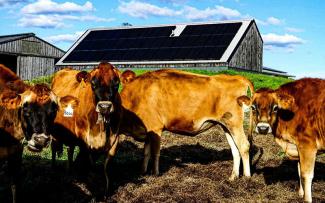
As part of its continued efforts to grow Rhode Island's green economy, the Rhode Island Department of Environmental Management (DEM) has announced $600,000 will be available to help local farmers "green" their operations and benefit from the related energy and cost savings. The new Rhode Island Farm Energy Program supports energy efficiency projects and helps farmers transition to renewable power.
Local Agriculture and Seafood Act (LASA)

The Rhode Island Department of Environmental Management, Division of Agriculture administers the Local Agriculture and Seafood Act Grants Program. The goal of the program, which was established by the Local Agriculture and Seafood Act (LASA) of 2012, is to support the growth, development, and marketing of local food and seafood in Rhode Island.
Resilient Food Systems Infrastructure Program
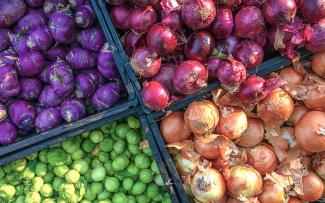
The purpose of the Resilient Food Systems Infrastructure Program (RFSI) program is to develop and administer state-coordinated initiatives to build resilience across the middle of the State’s food supply chain for food crops. Funds will support expanded capacity for the aggregation, processing, manufacturing, storing, transporting, wholesaling, and distribution of locally and regionally produced food products, including specialty crops, dairy, grains for consumption, aquaculture, and other food products, excluding meat and poultry. DEM will work in partnership with USDA to make competitive sub-award investments in middle of the supply chain infrastructure (Infrastructure Grants) to domestic food and farm businesses and other eligible entities.
Specialty Crop Block Grant Program
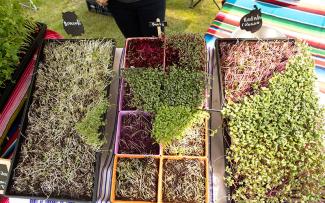
The RIDEM/Division of Agriculture is pleased to announce the availability of Farm Viability grant funds to enhance the Competitiveness of Specialty Crops grown in Rhode Island. Specialty crops are defined by this federally supported program as fruits and vegetables, dried fruit, tree nuts, and nursery crops, including floriculture such as Christmas Trees, cut flowers, honey, hops, and turf grass production. Examples of enhancing the market competitiveness of specialty crops include, but are not limited to Research, promotion, marketing, nutrition, trade enhancement, food safety, food security, plant health programs, education, "buy local" programs, increased consumption, increased innovation, improved efficiency and reduced costs of distribution systems, environmental concerns and conservation, product development, and developing cooperatives.
Organic Program
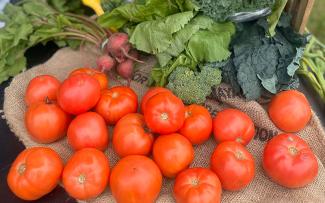
Certified organic operations in Rhode Island may apply for USDA organic certification cost-share reimbursement through RIDEM Division of Agriculture annually when funds become available and after forms and information have been updated: “USDA Organic Certification Cost-Share Reimbursement Application” at DEM's Organic Program Webpage.
The USDA Farm Service Agency (FSA) Kent County office also has accepted applications for organic certification cost share reimbursement—please contact FSA for current program status. Required FSA forms and contact information are online.
RI Produce Safety Improvement Mini Grants
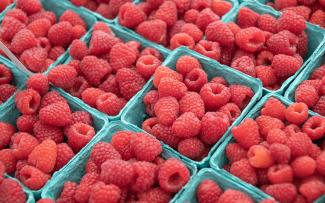
Rhode Island Produce Safety Improvement Grants help Rhode Island produce growers implement on-farm food safety practices, transition to compliance with the Food Safety Modernization Act (FSMA) Produce Safety Rule, and meet market demands for on-farm food safety. This grant round allows for up to $35,000 of funding in grant opportunities to assist eligible Rhode Island farmers and food businesses with projects that have goals to improve quality, efficiency, and food safety.
Additional Grant Opportunities
The Northeast Regional Food Business Center is one of 12 Regional Food Business Centers selected by the USDA. RFBCs will support a more diverse and competitive food system, with a strong emphasis on building equity and community resiliency through targeted outreach to underserved farmers, ranchers, and food businesses. Funding Types Awards to Technical Assistance Providers (up to $75,000) Technical Assistance Sub-Awards will be available for technical assistance providers to guide local producers and food and farm businesses on supply chain coordination, market development, accessing financial resources, and a variety of other business assistance training. Technical assistance provider applicants who have a history of serving underinvested communities will be prioritized, with an emphasis on those who have experience in tailoring support to individual needs and the unique Northeast regional food systems. Business Builder Awards (up to $100,000) Business Builder Awards will target small and mid-sized food and farm businesses seeking support in access to capital, supply chain coordination, and similar barriers to expansion. Eligible uses of grant funding include but will not be limited to staffing, strategic planning, marketing and outreach, business development, supply chain analysis, and equipment.
Learn more
Launched in 2020, the New England Farmer Microgrants Program (NEFMP) is a grant program that provides direct financial support to farmers across New England. The program seeks to address some of the key barriers faced by farmers in the region: access to farmland, farm succession/transfer planning, and the adoption of regenerative farming practices.
The program’s Farmland Access, Succession, and Transfer Support Grants provide direct financial assistance to farmers for projects that facilitate farmland access, succession, or transfer. Some examples of eligible projects include: farmland purchase or leasing transaction costs, consultant and attorney fees, surveys, appraisals, agriculture conservation easement fees.
